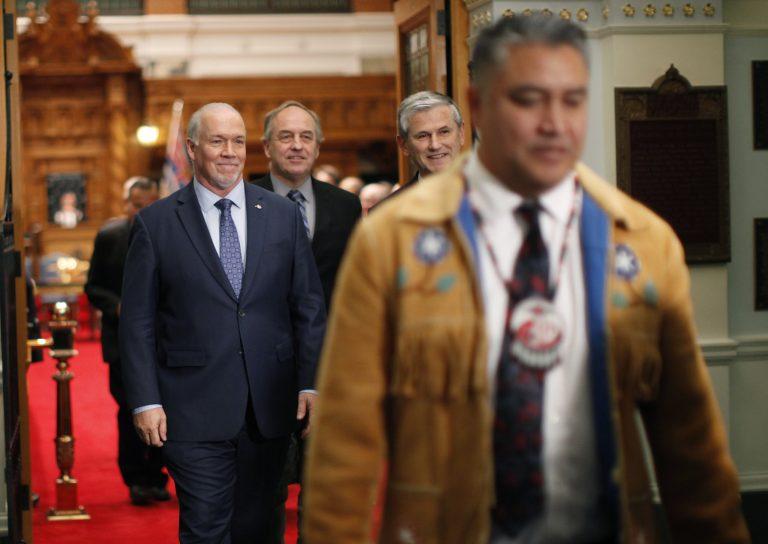Why Canada needs an independent Indigenous human rights commission
Natan Obed: B.C.’s provincial UNDRIP law creates a self-reporting obligation, which has proven faulty in the Wet’suwet’en situation

Regional Chief Terry Teegee leaves the legislative assembly joined by Premier John Horgan, B.C. Green Party leader Andrew Weaver and B.C. Liberal leader Andrew Wilkinson following an announcement about Indigenous human rights being recognized in B.C. with new legislation during a press conference at the provincial Legislature in Victoria, on Oct. 24, 2019. (Chad Hipolito/CP)
Share
Natan Obed is the president of Inuit Tapiriit Kanatami, the national representative organization for Inuit in Canada
British Columbia passed a Declaration on the Rights of Indigenous Peoples Act in November 2019, yet the provincial government continues to encounter resistance in advancing a pipeline project it has deemed legal through Wet’suwet’en territory. The members of the Wet’suwet’en First Nation who are resisting the project argue that their free, prior and informed consent has never been secured and that their human rights are being violated.
The United Nations Declaration on the Rights of Indigenous Peoples (UNDRIP) affirms the right of Indigenous peoples to self-determination, and further instructs states to obtain the free, prior and informed consent of Indigenous peoples before adopting and implementing legislative or administrative measures that may affect us. In 2016, Canada declared that it is now a full supporter of the UN Declaration without qualification.
In the Wet’suwet’en situation, and in countless others, the state is the arbiter of whether it has discharged its human rights obligations to those impacted. This is because B.C.’s declaration does not provide recourse or remedy provisions within its legislation. The law does create a self-reporting obligation for the B.C. government to document its own actions in order to align provincial law with the rights affirmed in UNDRIP. But these provisions have proven unable to help in this situation.
MORE: These protestors know more about Indigenous issues than you think
Federally, the Liberal government has committed to introducing UNDRIP legislation this year. In contrast with the B.C. UNDRIP legislation, federal legislation must systematically affirm our human rights by creating redress mechanisms within the legislation for those whose rights have been violated.
B.C.’s legislation is nearly identical to Bill C-262, the federal private member’s bill that died on the order paper last year. Our organization, Inuit Tapiriit Kanatami (ITK), which represents Inuit at the national level, advanced amendments to C-262 that would strengthen it. Specifically, we sought to include provisions that would create an independent, national Indigenous Human Rights Commission analogous to the Canadian Human Rights Commission. An Indigenous Human Rights Commission would be responsible for monitoring federal compliance with the rights affirmed by UNDRIP, and promote and assess implementation of those rights nationally.
ITK’s position is consistent with Call for Justice 1.7 of the National Inquiry into Missing and Murdered Indigenous Women and Girls to establish a national Indigenous and human rights ombudsperson with authority in all jurisdictions, and to establish a national Indigenous and human rights tribunal. Full implementation of UNDRIP, combined with universal access to recourse and remedy through mechanisms outlined in the National Inquiry’s final report, would set a new foundation for our relationship with the federal government.
MORE: The Wet’suwet’en are more united than pipeline backers want you to think
Such a commission should also be consistent with the UN Paris Principles, which provide the international benchmarks against which national human rights institutions can be accredited by the Global Alliance of National Human Rights Institutions. The UN Paris Principles set out criteria in relation to autonomy from government, independence, adequate powers of investigations, resourcing, pluralism, and mandate and competence. The Canadian Human Rights Commission was established consistent with the Paris Principles.
As an independent body, the Canadian Human Rights Commission is empowered to conduct investigations of federal departments and institutions, and send discrimination-related complaints to the Canadian Human Rights Tribunal for further examination. The federal government’s decision to establish a Canadian Human Rights Commission was a recognition that rights without remedies are not rights at all.
The UN Convention on the Rights of Persons with Disabilities or the UN Convention on the Elimination of Racial Discrimination are examples of the failures of an approach without adequate redress for violation. These longstanding international treaties were ratified by Canada, yet have never been fully implemented in Inuit Nunangat, where profound gaps in services remain for the most vulnerable members of our society. The most glaring challenge: governments, which are reluctant to hold themselves accountable for non-compliance, and have the sole responsibility to report on their own conduct in implementing the rights affirmed in those treaties.
Federal UNDRIP legislation that merely creates a reporting obligation or “action plan” for the government to monitor and report on its own conduct will not result in implementation of our rights. It will only further entrench a discriminatory legal framework in which Canadian Indigenous human rights are monitored using purposefully inadequate standards in relation to the human rights of all other Canadians.